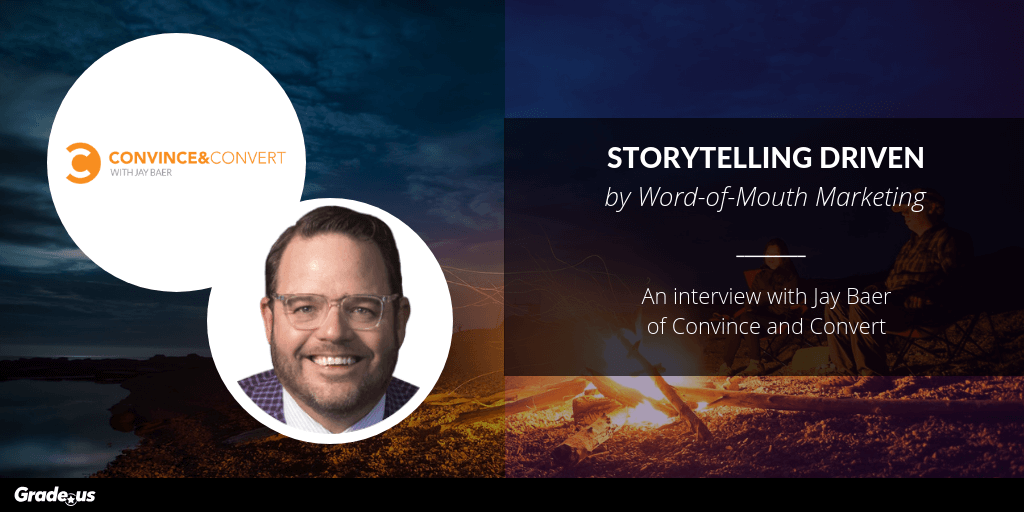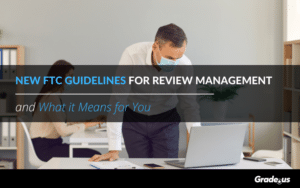Whether you're a marketing consultant trying to help your clients succeed or a small business owner trying to get more customers, mastering the art of word-of-mouth advertising and making reviews work for you is crucial.
Jay Baer is the President of Convince and Convert, an agency dedicated to, among other things, word-of-mouth consulting and online reputation consulting.
He's spent 24 years becoming a digital marketing expert, and is the author of Talk Triggers, Hug Your Haters, The NOW Revolution, and the Youtility book series.
Jay had a lot of incredible insights to share about word-of-mouth advertising and review management. Here's the transcript of our chat.
Carmen: Your new book, Talk Triggers, highlights how businesses can harness the power of word-of-mouth marketing. How do you think that word-of-mouth marketing translates into the digital space, what's the best way to track it digitally, and is there some new technology that businesses should be using to track that?
Jay: The data show that about 50% of all word-of-mouth happens offline, and 50% happens online.
Social media, ratings and review sites, discussion boards, and forums.
So online word-of-mouth, digital word-of-mouth if you will, is incredibly extensive, and very, very important.
One of the things that's interesting is people tend to talk about things a little bit differently online versus offline, because typically online you may not know everybody who is looking at your recommendation, nor are you sort of in the same room, right, so it's just a little bit of a different conversation pattern.
But digital word-of-mouth is incredibly important, and one of the things we look for a lot when we're doing word-of-mouth strategy for our clients at Convince and Convert, and we talk about it in the book Talk Triggers as well, is to use social listening as a way to determine whether or not your "talk trigger," your word-of-mouth strategy is actually creating conversations amongst customers.
Carmen: Could you explain a little bit more about what "talk triggers" are?
Jay: Sure, a talk trigger is a strategic operational choice that you make in your business that compels word-of-mouth. It's something that you do differently that people notice and talk about, and when they do that it turns their customers into volunteer marketers. They do some of your sales and marketing for you.
"You won't believe what they did, that was really amazing!" It creates a consistent story about your business.
Word of mouth represents or at least influences between 50% and 90% of all purchases, so it's pretty important to have an actual word-of-mouth strategy, a talk trigger, but unfortunately almost nobody does.
Carmen: And here I was about to ask you for an example of someone who has one!
Jay: Sure, there's lots of examples in the book. We have dozens and dozens of examples. But on the whole, most companies sort of take word-of-mouth for granted. They just assume their customers will talk about them, but that's not necessarily the case.
And so, what a talk trigger does is gives customers a consistent story to tell. So you're doing word-of-mouth on purpose, instead of word-of-mouth on accident.
I'll give you an example of a talk trigger, and it's quite relevant, because we are currently on an Uberconference call, and Uberconference is one of the case studies in the book. Because, as you may know, Carmen, they have incredibly hilarious on-hold music.
Carmen: Yes, they do!
Jay: So if you're on hold on an Uberconference call, it's really, really funny, it's a song written by the CEO, Alex, and it's unlike the on-hold music you will find anywhere else, any place else, under any circumstance.
It's a story that people consistently tell about Uberconference.
It shows up in their surveys. It shows up in social media. Their customers talk about it all the time. It is the one thing that Uberconference does differently than anybody else that does a free conference calling service.
It is their intentional, strategic word-of-mouth generator.
Carmen: Gotcha! So, moving off of word-of-mouth to the related issue of positive online reviews, what are some practical review acquisition practices a business could implement, and what's the best way to tap into the happy customer segment?
Jay: I'll give you two examples here.
So one...okay. Mini-rant here. Mini-rant coming.
One of the mistakes that we make in business is we think that competency creates conversation. That if you just run a good business that people will notice that and talk about it. But that's not really how the world works.
Nobody ever says, "Hey, let me make sure to tell you about this perfectly adequate experience I just had," because that's not a good story.
What is a review? It's a story.
It's a story about your interaction with that business. So if you want to get more reviews, your secret isn't necessarily to run a better business, though that helps a little bit.
The secret is to give people a consistent story to tell. One of the signature case studies in the book, one of my favorite examples in the whole world, is from Holiday World and Splashin' Safari, which is a family-owned water park and amusement park located in Santa Claus, Indiana, which is about 91 miles south of where I'm sitting right now.
It's called Santa Claus, cause there's some weird, random Christmas crap there. But it's truly in the middle of nowhere.
This business has been family owned since its founding in 1946. So they have some strategic disadvantages.
They're in the middle of nowhere, and I can't emphasize that to you enough, it is probably the worst place to put an amusement park.
Second, they're family owned, so they don't have a tremendous amount of budget. They can't just advertise their way to success.
And third, they're independent, so they don't have any characters. They don't have Mickey Mouse, or Harry Potter, or Spider-Man or anything like that.
What they have is Christmas Land, Thanksgiving Land, and Halloween Land...this is all true...but they understand talk triggers.
They understand how to give their customers a consistent story to tell that then shows up in all the places their customers tell stories.
So they do it two ways -
One: walk in, little hut. Look closer. Free sunscreen. Unlimited supplies of what I presume to be the cheapest possible sunscreen, but it is unlimited, right? You've got hundreds of people from Kentucky and Indiana lubed up with two handfuls of free sunscreen. It's a shiny crowd.
Two: they have free soft drinks. Totally free. Pepsi, Diet Pepsi, Mountain Dew, fruit punch, Gatorade, water, coffee, totally free.
Now, usually a soft drink at an amusement park is like $16,000 dollars. It's like crazy, crazy money. These guys give it away for free. Why? Well, if you look at their reviews, and they have thousands of 5-star reviews, you will discover that every single review, like every review mentions free sunscreen and free soft drinks.
So the secret to getting more reviews is a) to ask for reviews, but I think we all know that, but b) do something that people notice, something they want to tell a story about it.
That story will show up for some people as a review.
Carmen: Huh! Okay. Now in a different book, Hug Your Haters, you are talking a lot about customer's digital expectations. How quickly they're expecting a response on social media or review sites. What would you say has changed since that book was published?
Jay: I don't think our expectations have changed as much on review sites other than we are seeing, fortunately, and I don't have a data point on this because I haven't really studied it in survey form, but anecdotally I can say, and I suspect you'll agree, more and more businesses are responding to reviews because they increasingly understand that customer service is now a spectator sport.
In that no reply is a reply. It's a reply that says: "We don't care about your opinion. At all."
So the good news is using review management software, or just their own efforts, brings us a higher percentage of businesses taking the time to respond to reviews, and in many cases taking the cases to respond same day, which is terrific.
The data that we have show that people expect a reply from a review within a day or so, within a day or even two days depending on the industry.
So, if you can reply same day to a review, that will exceed the expectations of most customers, and that's certainly what you're trying to do.
Carmen: If you have a positive review versus a negative review would you say there's a different expectation, or is it about the same?
Jay: That's a good question. I haven't been asked that question in that way before.
The data show that in social media and via phone and via email, places where people very much anticipate and expect a reply, the more unhappy the customer is, the more they expect a response.
Reviews are a little different. Because a review isn't an email. A review isn't a voicemail. Although increasingly, as more and more businesses reply, you're starting to see that change a little bit.
I think it's safe to say, my opinion would be—and again, this is just my opinion, I don't have data on this point—but my opinion would be people who complain expect a reply more quickly than when they praise.
A complaint is a cry for help, praise is talking to the audience more so than the business.
Carmen: Do you think it matters what size the business is in terms of this response expectation? Or do you think it's pretty much the same whether you're dealing with the Mom and Pop or the Fortune 500?
Jay: I know a lot of Mom and Pops would hope that customers would give them a pass because they're a small business, but that's not actually true. We do have data on that.
The expectations of response time do not vary by company size.
Which is unfortunate if you're a really small business, but people aren't like, "Well, you know, it's just the three of them so they don't have time to respond." If you've had a bad experience, you don't care. You just want your problem solved.
Carmen: Fair enough. Let's say the business can't solve the customer's problem, at least in a timely fashion. Maybe they're asking for a massive product change, or they just don't have the resources in terms of support hours. How would they reply publicly in a way that shows empathy but acknowledges there just isn't an immediate solution?
Jay: Well, you answered your own question. The key is to respond.
What happens a lot of times is business say, "Well, we either don't have an answer or we don't have an answer yet, so what we should do is say nothing until one of those two problems are fixed. So let's just ignore what's been said here until we can answer it, and then we'll jump in."
Meanwhile, this whole time, the customer thinks you're blowing her off. So the best practice, every time, is to respond as quickly as you possibly can.
If you can't solve it yet because you've gotta go do some research or whatever, you just say that. "Hey, we are really sorry, we have seen this, we have heard you, we'll get back to you." That is the best practice 100% of the time.
Carmen: Now, let's talk about fake reviews, which are a huge issue for business owners. It's public facing. The review site's not taking it down. How does a business owner handle this?
Jay: I think it's tricky.
If you can't get it taken down, then I believe the best approach is to reply to the review, and sort of point out the challenges that you have with that particular review, but without getting into a sort of tit for tat.
One of the key pieces of Hug Your Haters is the rule to respond no more than twice. You never respond more than twice to anyone online because it's counterproductive, and you just get sucked into a flame war.
If you really feel like this review is bogus and you feel that to be true for a reason other than: "Our business is amazing! Nobody could ever have an experience like that," which, I've certainly seen that, unfortunately, with some businesses. Like: "This must be fake because everybody loves our restaurant."
Yeah, I know, but everyone has a bad day, too. So if you really believe it was bogus and you have evidence to suggest that it's bogus, then I think it's okay to respond and politely say,
"Thank you to take the time to leave a review, but maybe you posted this to the wrong business." Without accusing anybody. "I don't think this was actually the business you meant to review."
Something along those lines, just to go on record to say, "Hey, we're not certain about the actual accuracy of this review."
Carmen: So, in a non-confrontational way versus, "This person's not even our customer."
Jay: Yeah, because you a, you don't know that.
You may suspect that. But the chances you actually know that for a fact, probably not.
So you've gotta be real careful about throwing that out there. Because if that person is a customer, now you've got multiple problems that you've created.
Carmen: Very fair. So, we've got a lot of agencies and consultants providing review management services for clients. How do you think they should be helping their clients respond? Or do you even think they should? Should they stick to counseling them? What are your thoughts on that?
Jay: I think there's a couple of things. I believe third parties can absolutely help put together the protocols. So under what circumstances do we respond, who responds, what are the sort of operational frameworks of that? I think that's an important opportunity.
When you're creating the initial response matrix. "If someone says this, we'll say something like this." This is not a copy and paste, but sort of a scaffolding of responses.
I think it's helpful to have a third party look at those, because all business owners tend to get too close to it and get too emotional about it.
Now whether or not a third party is actually on the keyboard and responds on behalf of the business, I don't think there's any right or wrong answer there. I think it's purely a factor of resources.
I don't care who answers. I just want it answered. If you have to use a third party to get it done quickly, then you should.
Carmen: If you do use a third party, what's the best way for the third party to learn the fabric of that company so they can be more authentic when they're responding to those reviews?
Jay: Yeah, that's a great question.
You know, you really have to spend a lot of time in the business first. So I would first become a customer, multiple times.
Look at everything from the customer's perspective, not necessarily from the business' perspective. So quote-unquote 'secret shop' the business multiple times.
Then I think it really comes down to going side-by-side.
So not just saying, "As of tomorrow, the agency answers reviews." But the agency sits down and does a Skype call or shows up and hangs out at the desk.
As the business is responding, they're having a conversation. "Okay, what would you say here? Why would you say that? How would you say that?"
That kind of thematic transfer happens between the business and the agency, once the agency gets the keys to the car they're like, "Oh. I kinda know how to drive this car."
Carmen: Do you recommend any other strategies for agencies to help their clients with their online review portfolios?
Jay: I think certainly agencies can and should help their customers get more reviews, either through smart messaging, asking customers to leave reviews at the right time, in the right way, in the right modality.
Sometimes it's easier to ask via text message instead of via e-mail, etc. etc. etc., I think agencies can play a big role in successful review solicitation.
Carmen: Of course a lot of business owners, surprisingly, don't understand that review management is essential to their success. What would you say to try to convince them, or what should an agency who is trying to convince them say? What's speaking to them? Is it talking to them about the bottom line, about reputation, employee advocacy...what gets them on board with that understanding?
Jay: Some people are never going to get on board, because they just don't believe it. They just do not fully accept that's the way the world works today.
What I think is useful, is to have a business owner or manager keep a little log and say, "Hey, all the things you bought or all the things you went to or that you selected over the next three weeks, I want you to write down how you made that decision."
If you ask them to do that, and they come back and say, "Oh, I looked at reviews seven times."
And you're like, "Uh huh!"
So once business owners think like customers instead of like business owners they realize how important reviews are.
Sometimes they just kind of black out and don't realize that their behavior is the same as their customer's behavior.
Carmen: Because they're too close to it, like you said! One more question. What's your best piece of advice when it comes to how businesses should handle the evolving review ecosystem?
Jay: I think fundamentally we just have to understand that what customers say about you is way more important than what you say about you. Period. Because people actually believe it!
We spend all this time worrying about sales and marketing, and such a small amount of comparative time and money worrying about what our actual customers are telling other people about us.
We just have it upside down, still! There's only so many books I can write, but people still aren't getting it.
Carmen: Thank you for your time today!
Jay: Happy to do it!
About the Author
Andrew McDermott
Andrew McDermott is the co-founder of HooktoWin. He shows entrepreneurs how to attract and win new customers.










